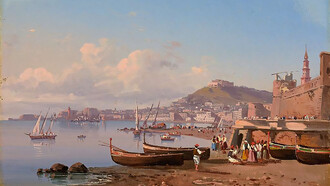Pafos has an abundant historical legacy with many wonderful cultural heritages sites. Among them the remains of Aphrodite’s (goodness of beauty and love) temple, castles, amphitheatres, fortress, the famous Roman period mosaics and the Tombs of the Kings in the UNESCO listed archaeological sites of Kato Pafos.
In ancient times, the first settlement of Pafos was built in Palaepafos (Kouklia) and then it was moved west to Nea Pafos (Kato Pafos). Nowadays, the town is divided into the upper part, which is known as Pano Pafos or Ktima and the lower part near the sea, which is know as Kato Pafos.
In the 1980s Pafos became a major tourist destination, and in 1980 the archaeological sites of Kato Pafos were included o the list of UNESCO World Heritage Sites, placing Pafos on the international map as the cultural city of Cyprus.
The first capital of Cyprus in Hellenistic and Roman times is now once again a capital: the European Capital of Culture for 2017.
Pafos: the European Capital of Culture for 2017
The European Capital of Culture is the most important cultural institution of Europe and one of the most prestigious cultural events in the world. The award of this title is a great tribute for any European city and country. The European Capital of Culture is a title designated by the European Union for a period of one year during which a city is given the opportunity to highlight the importance of cultural development, to involve citizens and creators in this process and to promote European cultural identity.
The European Capital of Culture Programme was launched in 1985 and by 2019 the title will be awarded to 60 cities in 30 countries. The Project has become a key platform for city positioning and a catalyst for economic and cultural regeneration. This prestigious title has developed a significant audience in both Europe and across the world.
It is a high level cultural project that is monitored by the European Commission so that its programme content is maintained to the highest standards. The impact of the Project can be evaluated through the change that is stimulated through cultural and social capacity building, by infrastructure improvements and cultural venue development, but also by the economic impact from the upsurge of visitors to the city.
The implementation path of a European Capital of Culture has turned into a model followed by many European cities seeking cultural growth and image change. The European Capitals of Culture have become a popular destination while the variety and the quality of their cultural programme acts as an important catalyst for cultural tourism.
The Pafos 2017 Organisation was established in 2013 as a non-profit limited company assigned with the task of creating a programme of cultural and community events of the highest standard. The Pafos2017 Organisation is responsible for the implementation and management of the European Capital of Culture project, based on the proposal that gained Pafos the title in 2012.
Pafos 2017 will be organising 300 events and projects all over the city and region and in other cities of Cyprus. Through cultural events, community involvement activities, visitor focused projects and city legacy programmes, the Organisation envisages to attract to Pafos large audiences both local and foreign, creating a distinct cultural character for Pafos and by extension for Cyprus.
This central concept of the Pafos 2017 programme was developed based on a tradition spanning thousands of years when culture was enacted out in the open air and on the acknowledgement that there is a necessity for a new openness in our way of thinking, living and acting so that we may re-connect spaces and people in our region. The Open Air Factory guarantees a wider outreach into all parts of the region and community, mass exposure for the Pafos 2017 activities and a shared space open to communication and collaboration. The concept of the Open Air Factory is not just about the openness of space; it is about tolerance, acceptance, encouragement and inclusion of different cultures, ideas and beliefs. The Open Air Factory will encompass the entire district, both spatially and socially. It will have a decentralised structure with various sections, units, and workshops within the centre of Pafos, extending outwards to the district’s municipalities and smaller communities.
Linking Continents – Bridging cultures
Pafos has always been at the crossroad of the Eastern Mediterranean and through its modern multicultural reality Pafos now aspires to be the first European Capital of Culture, which will link East and West. Its geographical proximity to the Middle East as well as to the European mainland, positions Pafos to act as a link for cultural exchange.
Expresses the need for linking and bridging the differences between Pafos’ various groups of citizens: residents, visitors and migrants. Moreover, it stresses the importance of uniting the scattered parts of the city and transforming the entire district of Pafos into a common and a shared space for all its citizens – symbolically and physically.
Last but not least, it highlights the need for bridging the differences between the Greek and the Turkish Cypriot communities through various comprehensive and capacity building projects that Pafos 2017 will development along the way.
The programme themes of Pafos 2017:
Myth and Religion: This thematic line refers to Pafo’s cultural heritage, historical background, reflecting and placing prominence to the characteristics that gave birth too civilisation and defined its evolution throughout the course of history. Within this thematic line the projects will develop themes on beauty, divinity and mysticism, weaving stories and legends that go beyond Pafos and can be found in the European civilization.
World Travellers: This thematic line refers to the relationships of people over time and expresses the interactions and the mutual influences, not only through conflict and dispute, but also through collaboration, exchange, brotherhood and co-existence.
Stages of the Future: This thematic line refers to the present and the future. It presents the contemporary world with its technological breakthroughs, its significant problems, its dreams and hopes, and its initiatives and ideas for change. The common future of the two Cypriot communities and the development of an intercultural dialogue are key topics.
The opening ceremony: 28-29 January 2017
Inspired by the rich mythological surrounding the history of Pafos, the Opening Ceremony will take place in the cultural centre of Pafos, with a background of the beautiful neo-classic school buildings, traditional mansions and the town hall. The location of the event, the buildings, the streets, familiar surroundings, will become the Open Air Factory on the night of the ceremony. Music, dance, theatre, street shows and many other parallel events will be held throughout the city, over this two-day event, giving locals and visitors a taste of what will follow throughout the year.
Summer Highlight ist 1st July 2017
Inspired by the thematic line World Travellers the event will take place at the harbour area, the landing point where throughout history travellers arrived in Pafos. Fleets of boats, fire in the sea, underwear surprises, 3D mapping of the castle, light shows, digital media, and music are just a few of the activities that will take place during this spectacular event.
Source: Pafos 2017















